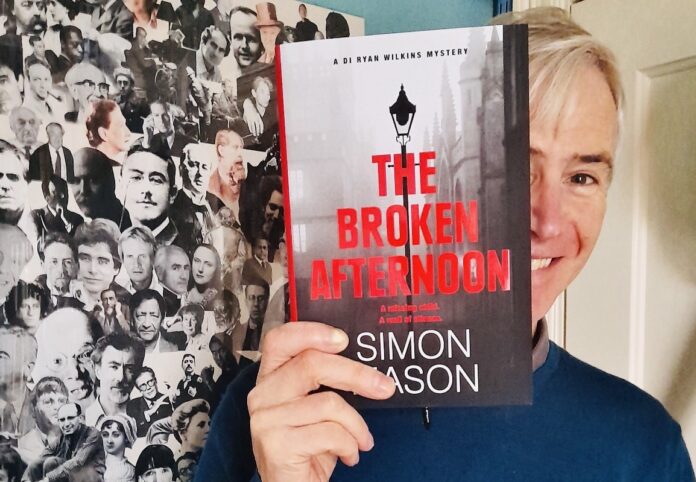Author Simon Mason doesn’t watch TV or go to the cinema, hasn’t watched Lewis or Endeavour and is unaware of JK Rowling’s Cormorant Strike.
And yet his new detective series – The DI Ryan Wilkins Mystery – is absolutely brilliant, and a valid contender for Oxford’s crime crown, as Endeavour comes to an end, critics describing him as “Inspector Morse for the 2020s.”
“I am shielded by my cloak of ignorance. If I knew a lot about crime writing I would probably be very intimidated,” Simon laughs when we meet at Oxford’s Covered Market, before he scurries back to Oxford University where he is a Royal Literary Fund Fellow at Exeter College.

So when not teaching and nurturing creative writing there and at Oxford Brookes, you can find Simon writing detective novels at his home in Oxford.
If you haven’t come across his main protagonist DI Ryan Wilkins yet, you’re missing out because he’s such a novel, compelling and unlikely detective.
Coming from a hugely deprived and abusive background, and brought up on a notorious Oxford caravan park, DI Ryan Wilkins is accepted into the police via a diversity programme and immediately puts everyone’s backs up – from his superiors, to those he’s investigating, and fellow DI Ray Wilkins.
Luckily however DI Ryan Wilkins is brilliant at solving murders, first in A Killing In November set in an Oxford college, and now The Broken Afternoon where a child is snatched from a North Oxford nursery. Both are dangerously addictive and page-turning. Take it from us, you’ll be riveted.
But who is Simon Mason, appearing from nowhere with these valid, gripping and captivating stories? “I just write about what I know, so it’s laziness really,” Simon laughs. “And Oxford really is a mix of town and gown, the university versus the rest of the city, so I’ve juxtaposed that with DI Ryan Wilkins’ lack of uniform, rank and rules to heighten the drama.”

There is no ego to Simon. He is surprised how much we loved his books, how you can already visualise them on the screen and how engrossing his plots and characters are.
“I don’t get emotional about my story or characters but I am primarily visual. I like to write about what’s around me,” he says.
So when Simon was cycling into Oxford one day past a lad coming out of a caravan park, who gave him a V sign and asked what he was looking at, instead of being offended, Simon thought about how great it would be if the young man turned out to be a a policeman and not a criminal. “It went from there really. I wondered about getting someone like him thorough the diversity programme despite his behaviour and bad manners.
“So even though Ryan has no filters, and does things by instinct, everyone can relate to him even if he’s quite shocking. I need to like and dislike my characters at the same time,” Simon explains.
As for his sudden appearance, Simon has actually been writing books for years, first children’s and then young adults, his Garvie Smith Mysteries doing so well he was then asked to write for adults.
“I wanted to provide a crime series for young people without so much violence, gore and sexualisation, while still making them gritty and relevant, and I think that’s what we did. But writing for adults has been a steep learning curve.”
With Oxford on his doorstep, Simon also has a rich literary vein to draw from. “I’m giving people what they want by setting it in Oxford but then I twist it,” he accedes.

Having lived here since attending Lady Margaret Hall, Simon knows it well, and yet his relationship with the city is complex. When he arrived here as a student from a state school he was the only child of ‘aspiring working class’ parents.
Simon’s father was captain of Sheffield United and his parents went to the theatre and out for dinner, his mother training as a sex therapist. “They wanted me to be educated and I was first one to go to university,” he recalls.
And yet when he got to Oxford, Simon says he was hopelessly out of his depth, found academic life bewildering at best and didn’t know where he fitted in, developing severe anorexia as a result.
“I wasn’t very happy no. I just didn’t understand how it worked. Everyone was brighter, more beautiful and so much more assured. They just seemed to know what to do all the time. I had imposter syndrome I suppose and got very anorexic. It was my friends who saved me really.
“So I understand outsiders as much as I understand the establishment and privilege of Oxford life. And Ryan is the same – he doesn’t know how to do things in the right way, but that’s life right? As long as justice is done.”

And with the next DI Ryan Wilkins Mystery due out in January – Lost and Never Found – and Simon is also writing a parallel series based on missing person cases, so watch this space.
Intrigued? You can see Simon Mason for yourself on Saturday March 25 at Oxford Literary Festival in Writing in the Shadow of Morse with fellow crime writer Cara Hunter, chaired by Peter Guttridge where they will be discussing their approach to writing about one of the capitals of crime fiction. book it here
And there are also copies of both A Killing in November and The Broken Afternoon up for grabs in our competition with Simon Mason’s publishers Quercus.
COMPETITION DETAILS:
To win a copy of A Killing in November and The Broken Afternoon, all you have to do is follow us, tag us, like and share the relevant posts on social media.
Instagram: @oxinabox_new https://www.instagram.com/oxinabox_new/
Twitter: @oxinaboxnew https://twitter.com/oxinaboxnew
Facebook: @oxinaboxnew https://www.facebook.com/oxinaboxnew
Competition Terms:
- Prize: One winner will win a copy of both A Killing in November (paperback) and The Broken Afternoon (hardback)
- Prizes are not transferable and may not be used in conjunction with any other offer.
- There are no cash alternatives.
- You must be 18 years old or older to enter
- The closing date for entries is Sunday Feb 19 at midnight.
- Our decision is final and no correspondence can be entered into.
For full terms and conditions go to: http://551.326.mywebsitetransfer.com/ox-in-a-box-competition-terms-and-conditions/

















